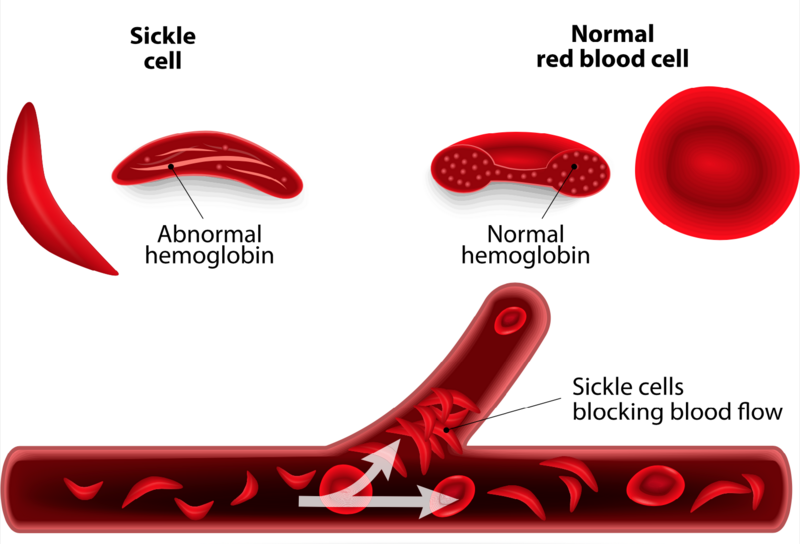Resolved to solving sickle cell disease
GRA-led initiative leverages, expands Georgia's strengths and assets
Georgia’s Solve Sickle Cell Initiative (SSCI) aims to leverage the state’s considerable strengths in university research and healthcare – and break new ground in knowledge, treatment and cures.
Organized and executed by GRA, this five-year, $16-million endeavor unites Morehouse School of Medicine, Emory University and Children's Healthcare of Atlanta by adding:
- Mindpower. By recruiting the Calvin Smyre GRA Eminent Scholar, the Teresa White Director of Clinical Programs and two other GRA Distinguished Investigators – some of the brightest minds in Sickle Cell Disease research – Georgia will immediately expand existing research capacity. • In August 2024, acclaimed researcher and global educator Solomon Ofori-Acquah was named to the Calvin Smyre chair >
- Lab infrastructure. While Georgia’s university labs are generally well-equipped, crucial pieces of technology and instrumentation are needed to support the research of newly recruited scientific teams.
- Clinical and market translation. The footprint of treatment at Children’s Healthcare of Atlanta will expand so that clinicians can evaluate new approaches developed by Georgia’s university scientists. Companies will be seeded and shaped around high-potential inventions emerging from the labs.
GRA launched the statewide Solve Sickle Cell Initiative in May 2021 at a news conference in Columbus. Gov. Brian Kemp announced the initiative and the creation of the Calvin Smyre GRA Eminent Scholar chair, an endowed chair, with Rep. Smyre on hand.
About Sickle Cell Disease
The need for new approaches and efforts to fight sickle cell is clear. Typically diagnosed around 5 months of age, sickle cell disease brings a lifetime of sudden events – from searing pain in hands and feet to hemorrhaging and stroke.
The disease is an inherited blood disorder, manifest by two genes (one from each parent) that together bring about abnormal hemoglobin. For a person with sickle cell disease, red blood cells are not all smooth disks that glide and flow easily through the bloodstream. They become hard, spiky crescents, and when these “sickles” clump together, blood flow is impeded. More about the disease >
Why Georgia?
Georgia has the third-highest incidence of sickle cell disease in the U.S. Currently, 124 census tracts in our state have high rates of incidence and are medically underserved areas.
But Georgia also has an extraordinary foundation of university research and clinical care in sickle cell disease:
Children’s Healthcare of Atlanta has the nation’s largest pediatric sickle cell disease program: The Aflac Cancer & Blood Disorders Center within Children’s, with 2,000 unique patients treated annually.
Children's also performs 70+ blood and marrow transplants per year, with 116 children cured of SCD and provides a robust cell and gene therapeutics program.
Emory University attracts $5.4 million in annual funding for SCD research, including eight NIH grants. Emory is leading an international study on long-term outcomes / late effects of blood and marrow transplants for SCD patients. Emory also:
- offers comprehensive clinics, transfusion services, specialty clinics and inpatient care
- manages a unique database on health outcomes for 2,600+ SCD patients
Morehouse School of Medicine (MSM) brings deep expertise in implementation science to promote the adoption of evidence-based practices in SCD treatments and research participation. MSM also has:
- genomics and hemoglobinopathies training, conducting lab, clinical and population-based research
- pediatrics physicians on staff at Children’s Healthcare of Atlanta (Hughes Spalding Hospital)
Other Georgia Assets
- The Georgia Comprehensive Sickle Cell Center at Grady Hospital is the world’s first 24-hour acute care center for adult patients with SCD
- 12 GRA Eminent Scholars at Georgia universities engage in research related to sickle cell disease
- The Sickle Cell Center at Augusta University is a multi-disciplinary center for research & treatment
- The Health Policy Center at Georgia State University provides policy guidance
- The Sickle Cell Disease Foundation connects SCD patients and families to social services
- The Atlanta Sickle Cell Consortium unites physicians and researchers to coordinate efforts to advance treatments and develop cures
More about the initiative
GRA designed Georgia’s Solve Sickle Cell Initiative to bring:
- An infusion of tens of millions of dollars in new private and public research grants (to support the work of newly recruited scientists)
- Significant new insights into – and potential new treatments for – Sickle Cell Disease
- The launch of new private enterprises to bring inventions and discoveries to the clinic and marketplace
- An elevation of Georgia’s influence and profile for taking a leadership position in addressing a critical health threat.
The Solve Sickle Cell Initiative was made possible through the generous support of
The Woodruff Foundation
AFLAC
Dan and Kathelen Amos
Crawford & Company
Genuine Parts Company
Georgia Power Foundation
Pete McTier
Diana Murphy
Regions Bank
Synovus
Lizanne Thomas
Truist
United Distributors
Weathertop Foundation
We are grateful for their support!



